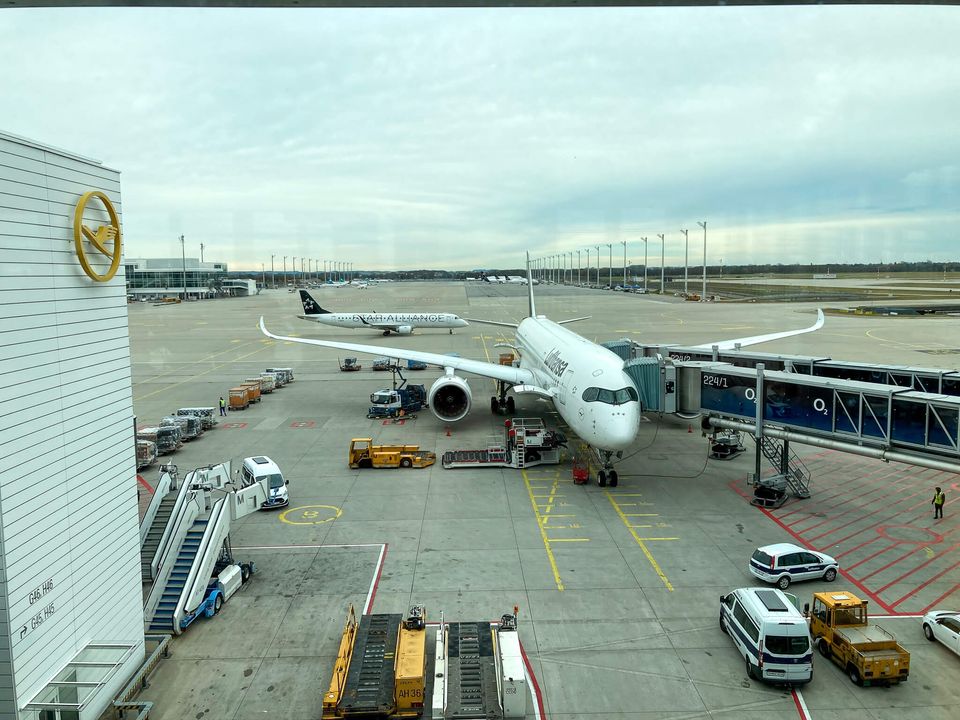Flying Again

Greetings fellow travelers.
One thing we definitely underestimated when we moved to the U.S. was how much we'd miss. We were looking ahead, focused on the culture shock of moving to the U.S. And indeed, we've experienced dislocation in our new home. No surprise, things are different than before, in smaller and larger ways. I haven't shared too many of our impressions yet, but we're keeping track and organizing our thoughts, so stay tuned.
In the meantime, we noticed an interesting thing: when you are taking proactive steps, doing things in other words, it is easy to just focus on the task at hand.
- Need to get your driver's license? OK, here's where the nearest Department of Motor Vehicles is, there's the form we need to fill out, and these are the documents we need to bring with us.
- Need to sign up for health insurance? How much information can we find on-line, how many service providers are even available in South Carolina, and what are our options?
- Need to buy something for the new household? Where is there a Target, Wal-Mart, or Home Depot that might suit us? Can we get it on Amazon?
Repeat this over and over for one task after another and we have found there are some helpful consequences. To start, you're busy, which means you don't have a lot of extra time to get stuck in your head worrying about other things. Further, you are making progress on many tasks. This provides a satisfying sense of accomplishment and means you get regular positive reinforcement related to your daily activities.
Now we're starting to experience the quiet that comes after completing countless small tasks. In the quiet comes space for disquiet, in the form of thoughts that make their way back to the front of our minds. We left behind a lot in Switzerland, and it turns out those connections are sticky. Our house and everything in it, our vehicles, our work, our friends and social life. And most prominently, our children.
It's not unusual for kids in the U.S. to leave home at around age 18. Some go off to college, others start work, and most start to chafe at the restrictions of living under the same roof as their parents. Emotional and physical maturation, together with a newfound confidence in their own abilities, lead to them having a growing desire for greater flexibility and freedom. For all these reasons, it is the normal order of life for young adults to leave their family home.
We certainly felt like our children were old enough, ready for some independence, and more than trustworthy. They were 20 and 22 when we flew the nest. I suppose that's one of the things that makes our situation seem different. My wife and I were the ones who left the family home, although our eldest had already moved out for school.
Another difference is perhaps the extent to which we afforded our kids their independence. Six time zones, seven thousand kilometers, and a continent (or an ocean, depending on your perspective) now separate us. Our weekly video call does not make this distance appear smaller. If anything, it is a regular reminder of how far away we are.
The typical reaction we get when we meet people in our new town does not help the feeling: "Wait, you moved away from Switzerland? What on earth for?! And you left your kids behind?" It does not relativize things for them when we point out that their kids moved out already years ago. And it doesn't really for us either, if I'm honest.
I remember when we first moved to Europe back in 1996. This was just after we got married. We were pre-kids and free of many of the entanglements that soon come to tie people down. That move was easier from that perspective, but it still opened up a gulf between us and our families. Back then, we kept in touch with mail (as in letters, or snail mail) and the infrequent, expensive phone call. A trip home for the holidays perhaps. Did our parents miss us as much as we're now missing our kids? I am sure they did, although it is the nature of kids to be focused on their own affairs.
The closest we came then to the sense of separation we feel now was, ironically, when our kids were born. Our local friends starting families had friends and relatives and drew upon them liberally for support. We had a few visits from family, but it really didn't compare. We felt the absence of family acutely then.
As a small compensation, I always believed the distance to our extended family made our nuclear family that much closer. We had each other and could count on each other. Now that I think of it, that very closeness built up over 20 years of "our family versus the world" is probably what makes the current separation so poignant.
All this is a long way of saying we find ourselves traveling back to Switzerland more than we thought we would. It seems we still have one figurative foot in Switzerland, at least emotionally. We thought we were taking a giant leap, and we did. But we left enough of our hearts behind that we feel pulled. While I thought my frequent traveler days were behind me when I retired from my management role, I may have put away my ocean-crossing habits too soon.
If as a result we see our kids as often as, or more than, parents whose children are but a few hours or a few states away, are we really that much farther from them in all the ways that count? I say not if we keep making an effort.
What makes people fade away from one another is not distance, but lack of desire. Think of the friends you've drifted apart from, though they live in the same city. Now think of other friends you've kept over years, even though you see each other infrequently. In our case, if we want to be close to our kids, we will be close though an ocean separates us.
That said, a visit to replenish our supplies of Swiss chocolate every now and then is understandable, right?
Be well.






Member discussion